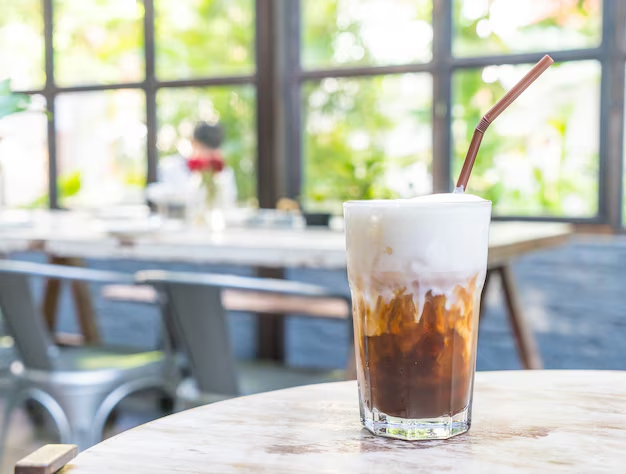How Long Can You Keep Iced Coffee in the Fridge? A Comprehensive Guide
For many, iced coffee is more than just a beverage; it's a daily ritual, a soothing companion for long work hours, or a refreshing afternoon pick-me-up on a warm day. While we appreciate the taste, many wonder how to properly store iced coffee and how long it remains fresh and safe to drink. Whether you're an enthusiast who enjoys homemade iced brews or someone who picks up a bottle from the store, understanding how long iced coffee lasts in the refrigerator is both practical and crucial for maintaining its delightful taste.
🧊 Understanding Iced Coffee
Before diving into storage specifics, it's essential to clarify what constitutes iced coffee. While variations exist, iced coffee typically refers to coffee that's brewed hot and then chilled. Some methods include:
- Regular Iced Coffee: Brewed hot and then cooled with ice.
- Cold Brew: Steeped in cold water for an extended period, offering a smoother, less bitter taste.
The shelf life may vary depending on the preparation method, influencing factors like acidity levels, which can impact how long your coffee stays fresh.
🌡️ Storing Iced Coffee: The Basics
The secret to preserving iced coffee lies in proper storage techniques, which begin immediately once the coffee is brewed and chilled. Here are key steps and tips:
Refrigeration: Iced coffee should be stored in the fridge at temperatures below 40°F (4°C) as soon as possible to reduce bacterial growth.
Sealed Containers: Using airtight containers keeps out unwanted flavors and helps maintain the coffee's integrity.
Avoid Flavor Additions: If possible, store iced coffee without sugar, milk, or cream. Add these elements only when you’re ready to drink it to prevent rapid spoilage.
📝 Quick Tips for Storing Iced Coffee
- Store in a sealed, clean container.
- Keep at a consistent, cold temperature.
- Separate any added flavors or milk for storage.
⏰ Shelf Life of Iced Coffee
How Long is it Safe?
- Freshly Brewed Iced Coffee: Typically, it remains in top condition for about 24 to 48 hours in the fridge. Beyond this period, the flavor may begin to degrade, though it might still be drinkable for a few days longer.
- Cold Brew: This variant can last up to a week if stored correctly, thanks to its unique brewing method, which tends to be less acidic and more stable over time.
- Pre-Packaged Iced Coffee: Often comes with a 'best before' date and specific storage instructions. These can last significantly longer when unopened, but should be consumed within the suggested timeframe once opened.
Deciphering Spoilage
Recognizing when your iced coffee is past its prime is an important skill. Common indicators of spoilage include:
- Off Smell: A sour or unpleasant odor can indicate bacterial growth.
- Mold: Visible spots or changes in surface texture are immediate signs.
- Taste: Any unexpected change or bitterness in flavor suggests the coffee has deteriorated.
☕ Factors Affecting Shelf Life
Several variables can influence how long iced coffee remains fresh:
- Brewing Method: As mentioned, cold brew typically lasts longer due to its lower acidity.
- Storage Conditions: Fluctuations in temperature or exposure to air speed up spoilage.
- Additives: Milk and other dairy substitutes shorten lifespan since they spoil faster than coffee itself.
🏠 Making Homemade Iced Coffee Last Longer
- Batch Preparation: Consider brewing in bulk and storing in portion-sized containers to minimize exposure to air whenever you pour a glass.
- Dedicated Storage Containers: Use glass jars or reusable plastic bottles to maintain freshness and avoid mingling flavors.
- Steer Clear of Freezing: While freezing iced coffee isn't generally recommended due to potential flavor loss once defrosted, freezing cold brew coffee concentrate works better if dilution is done upon thawing.
🔍 Exploring Related Topics
Ensuring your coffee is both delicious and safe to consume also involves understanding related storage concepts:
Preserving Coffee Beans
Fresh beans or grounds are a precursor to great-tasting iced coffee. Proper storage involves:
- Airtight Containers: Keep beans sealed tightly to prevent oxidation.
- Cool, Dark Storage: Avoid direct sunlight or warm areas that can degrade the coffee's quality.
Impact of Ingredients
- Sweeteners: Sugar or syrup can alter the shelf life. Natural additives might ferment or spoil quicker.
- Dairy & Milk Alternatives: Both dairy and non-dairy milk can introduce perishability. If added, it’s best to consume your coffee within 24 hours.
🗂️ Quick Reference Table: Iced Coffee Storage
| Iced Coffee Type | Storage Method | Estimated Shelf Life |
|---|---|---|
| Freshly Brewed | Airtight, refrigerated | 24-48 hours |
| Cold Brew | Airtight, refrigerated | Up to 1 week |
| Pre-Packaged, Opened | Follow package instructions, refrigerate | 1-3 days |
| Pre-Packaged, Unopened | Store as directed on package | Varies with 'best before' date |
🌟 Sum Up: Key Takeaways for Storing Iced Coffee
- 🔄 Store Vigilantly: Always choose airtight containers and maintain consistent refrigeration.
- 🕒 Shelf Life Varies: Recognize the timeframe of freshness, differing between types and storage methods.
- ⚠️ Signs of Spoilage: Be aware of changes in smell, appearance, and taste.
- 🍶 Effective Preparation: Brew in advance, store properly, and add flavors only when ready to consume.
By understanding these storage nuances, you can ensure your iced coffee remains a refreshing delight, retaining its characteristic flavor and aroma. Enjoy every sip with the confidence that your beverage is as fresh as it is flavorful.

